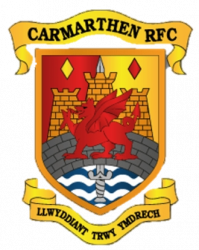“A STEP BACK IN TIME”
Carmarthen Harlequins 2nds XV 3pts; Johnstown XV Nil.
(By kind permission of the Carmarthen Journal)
1920/21 SEASON
6th November 1920
The premier team being away, the Harlequins Seconds were on view at Carmarthen Park on Saturday afternoon when they opposed Johnstown and emerged winners by one try (3 points) to nil. Mr. D. J. Davies held the whistle. In the first half the Quins pressed throughout and could do everything but score. After W. Harries had nearly penetrated the defence, Johnstown were unfortunate to lose the services of Lewis Harries who received an injury to his shoulder. One of the ‘Quins cross-kicked and the ball rolled over the line – then there was a race in which Bertie Richards, the Johnstown custodian, was the winner and touched down for a minor. A short while afterwards Richards was again called upon to concede a minor. Reg Jones made a good but abortive attempt to drop a goal for the Harlequins and Jack Davies broke through in the most approved style, but his pass was a wild one. Half-time arrived with the scoring sheet blank.
The opening stages of the second half saw the ‘Quins still having the better of the argument and when the Johnstown line was in jeopardy Earnest Thomas relieved with a long kick. The ‘Quins rushed in a bunch over their opponent’s citadel but no score resulted. Led by their captain (Oliver M. Jones), with Oscar Rogers well in the van, Johnstown swept down the field and gave the ‘Quins a very anxious time. The suburbanites now showed greatly improved form and D. J. Peter tried to drop a goal in front of the Harlequin posts but the kick was charged down. The home pack came away and Johnstown were once more placed on the defensive. Earnest Thomas displayed opportunism by intercepting and finding touch in the Harlequins half.
This player’s huge punts was one of the features of the game and he saved his forwards a good deal of running about by these timely efforts. The Seconds got going and Johnny Evans (on the wing) and Moore indulged in some pretty interpassing, the former being tackled when breaking inwards. The ‘Quins pegged away and got over but a scrum was ordered five yards out. Not to be denied the Harlequins backs had another smart bout, the final transfer to Johnny Evans being well taken and Evans ran powerfully and crossed in the corner with a well merited try: Johnstown Nil.
The ‘Quins well deserved their victory and another three or six points would not have over estimated their superiority. Taken as a whole the game was a fairly interesting one to watch. It was mainly confined to the forwards but when the Harlequins backs obtained possession they provided the spectators with exhilarating rounds of passing. The great fault lay in running the wing men to touch. The only player who essayed to create openings and break through was Jack Davies, who, with more experience, should develop into a useful man for the Harlequins Firsts. His partner Evie Llewellyn was only moderate and has fallen off from last season’s form. Geo’ Bowen was nippy at centre and Johnny Evans was the better of the wing players.
Both Evans and Jack Davies are stylish players and with Bowen should be given every encouragement. The Harlequin forwards were well led by the veteran Llewellyn Arthur, a former captain of the premier team. Neither the Johnstown nor the Harlequin packs scrummaged properly and heeling was at a discount. Oliver Jones was a tower of strength to his side and was well supported by Oscar Rogers, both of whom were hard and persistent workers. The Johnstown rear division, with the exception of Earnest Thomas (centre); and Bertie Richards (full-back) were weaker than the Harlequin backs and displayed no initiative in attack. In fairness to the defeated team it must be conceded that they played fourteen men for practically the whole game. Johnstown should learn to remedy their defects by the time the return match is played.
